- News
- Reviews
- Bikes
- Accessories
- Accessories - misc
- Computer mounts
- Bags
- Bar ends
- Bike bags & cases
- Bottle cages
- Bottles
- Cameras
- Car racks
- Child seats
- Computers
- Glasses
- GPS units
- Helmets
- Lights - front
- Lights - rear
- Lights - sets
- Locks
- Mirrors
- Mudguards
- Racks
- Pumps & CO2 inflators
- Puncture kits
- Reflectives
- Smart watches
- Stands and racks
- Trailers
- Clothing
- Components
- Bar tape & grips
- Bottom brackets
- Brake & gear cables
- Brake & STI levers
- Brake pads & spares
- Brakes
- Cassettes & freewheels
- Chains
- Chainsets & chainrings
- Derailleurs - front
- Derailleurs - rear
- Forks
- Gear levers & shifters
- Groupsets
- Handlebars & extensions
- Headsets
- Hubs
- Inner tubes
- Pedals
- Quick releases & skewers
- Saddles
- Seatposts
- Stems
- Wheels
- Tyres
- Health, fitness and nutrition
- Tools and workshop
- Miscellaneous
- Buyers Guides
- Features
- Forum
- Recommends
- Podcast
review
£2,249.99
VERDICT:
A fast-reacting aero road bike in a race geometry for those with a need for speed
Weight:
8,250g
Contact:
At road.cc every product is thoroughly tested for as long as it takes to get a proper insight into how well it works. Our reviewers are experienced cyclists that we trust to be objective. While we strive to ensure that opinions expressed are backed up by facts, reviews are by their nature an informed opinion, not a definitive verdict. We don't intentionally try to break anything (except locks) but we do try to look for weak points in any design. The overall score is not just an average of the other scores: it reflects both a product's function and value – with value determined by how a product compares with items of similar spec, quality, and price.
What the road.cc scores meanGood scores are more common than bad, because fortunately good products are more common than bad.
- Exceptional
- Excellent
- Very Good
- Good
- Quite good
- Average
- Not so good
- Poor
- Bad
- Appalling
First published 20th August 2017
The new Bianchi Aria is an efficient aero road bike that's more accessible than any of the brand's Oltres. It's responsive and direct and handles sharply.
Bianchi's Oltres have always done really well in road.cc reviews. The only issue is that the cheapest complete Oltre XR1 is £2,699.99, the Oltre XR3s start at £2,799.99 and you won't get an Oltre XR4 for less than £5,200. The Aria is hardly a budget option but it does bring Bianchi's aero bike range down to a more affordable (yes, it's all relative) level.
> Find your nearest dealer here
The first thing you notice when riding the Aria is just how punchy it is and how ready to respond to increased effort. I went back and double-checked the weight of our 57cm model – 8.25kg (18.19lb) – because in use it feels a lot lighter and more chuck-aroundable than that.
The oversized bottom bracket shell (it's home to a press-fit 86.5 x 41 BB) holds everything in check well when you crank up the power, while the tapered head tube (1 1/8in upper bearing, 1 1/4in lower bearing) and full-carbon fork prove similarly solid at the front end. I couldn't detect any flex either when cornering hard or throwing the bike around on steep climbs.
One of the Aria's other attributes is easy manoeuvrability. Some aero bikes are good for straight-line speed but they're single minded and don't much like to deviate from that. The Aria is more than happy to flick from one line to another to navigate through a group or avoid something unexpected in the road.
Drag reducing
The Aria boasts many features designed to reduce drag, the most obvious being the fork legs and frame tubes that are slim and deep-section. The fork crown is integrated into the frame, the down tube is dropped with a slight cutaway around the front wheel, and the seat tube is cutaway around the rear wheel.
Bianchi says that the design of the slim seatstays was inspired by that of its Aquila time trial bike. These meet the seat tube low down to reduce the frontal area and manage the airflow in the rear brake area. The seatpost has an aero profile and comes with a wedge-type clamp that's recessed into the top tube.
Bianchi says that the bike 'has been heavily inspired by our extensive wind tunnel testing and cooperation with pro riders', although it doesn't say whether the Aria itself has been subject to CFD (computational fluid dynamics) analysis or taken to the wind tunnel, and doesn't put any specific figures on the bike's aero performance.
We don't have access to a wind tunnel and we're not in the business of guessing, so the furthest I'll go is to say that lots of tried and tested aero features are present and correct here.
With most of the drag when riding coming from you, the rider, rather than the bike, it's important that you get into an efficient riding position, and the Aria is designed to help you do that. Clearly, there wouldn't be much point going to the trouble of developing aero tube shapes and then having the rider sit bolt upright in the saddle.
The Aria is available in eight different sizes from itty bitty 44cm right up to a big ol' 61cm. I've been riding the 57cm model (I'm actually between Bianchi sizes; I could do with a 58cm Aria but there's no such thing) which has a 570mm effective seat tube (it would be 570mm if the top tube was horizontal) and a 560mm effective top tube. The head tube on this model is 155mm, which is certainly short.
The stack on this model is 557mm and the reach is 395mm. To save you the trouble of translating all those figures into something that actually makes sense, the bottom line is that the Aria puts you into a low, flat backed riding position when you're down on the drops, which is exactly what you'd expect.
All of the Aria's figures are the same as those of Bianchi's top-level Oltre XR4, as ridden by Team LottoNL-Jumbo in the world's biggest races, so you know what you're going to get here. This is a racing geometry aimed at riders with a need for speed. If you want a high front end for comfort, well, you can run a few spacers underneath the stem but, really, this isn't the best setup for you.
> 10 of the best £2,000-£3,000 road bikes
The Aria provides quite a firm ride, which isn't a euphemism for harsh – it's certainly not that. There's not a whole lot of up/down frame flex but the 25mm Vittoria Zaffiro Pro tyres offer a decent level of road buzz damping while the flat San Marco Quadra saddle comes with a generous amount (by race bike standards) of Biofoam padding. There's a lot of flex in the glass-fibre-reinforced shell too. Taken as a whole, though, the Aria feels more solid and sturdy than soft and yielding. I didn't feel the ride was as smooth as that of the (much more expensive) Bianchi Oltre XR4, for example.
Centaur back
We told you previously that Campagnolo was bringing its Centaur groupset back from beyond the grave and this is the first bike we've had in for review with the new version fitted. It's now 11-speed and features technology that has trickled down from the brand's higher level groupsets.
It's worth saying that the Ergopower controls provide all the comfort of Campag's top-level levers and the Vari-Cushion natural silicone hoods are grippy even when rain or sweat has made them wet.
The other key feature, as far as I'm concerned, is that the dual pivot brakes (front and rear) are good. Really good. I rode a bike fitted with the Centaur groupset when Campag took me out to the launch and I've ridden the Aria with a couple of different wheelsets fitted, and the brakes have bitten hard on all of them. Seriously, you'll be surprised. It's particularly impressive given that Centaur is Campag's fifth-tier groupset.
The one groupset component choice I had an issue with was the compact chainset (50/34-tooth chainrings). An aero bike necessarily has an emphasis on speed – that's in its DNA – so I'd rather have a 52/36-tooth chainset (Centaur isn't available in a 53/39-tooth option) to keep piling on the power that little bit longer on the descents. That's an individual preference, obviously.
The Aria is available in two other builds: Shimano 105 (£2,299.99) and Shimano Ultegra (£2,649.99), although it's a 50/34-tooth chainset whichever option you choose.
The Vision Team 35 Comp alloy clinchers (the 35 refers to the millimetres of rim depth) aren't especially lightweight but they're competent and strong. The hubs are CNC machined and fitted with sealed cartridge bearings. Despite some wet miles, no water or grit has got in and that bodes well for their durability. Personally, I'd go with something offering a higher level of performance for racing, but these should see you right for training rides in all weathers.
Speaking of racing, Bianchi bills up the Aria as being suitable for triathlon if you fit some clip-on aero bars. Of course, you could fit aero bars to any road bike with a suitable handlebar, but I guess the point Bianchi is making is that an aero frame with a short head tube has better tri credentials than most. Fair enough. That said, the seat angle on our 57cm review bike is 73.5 degrees which is well short of what you'll find on a dedicated time trial/triathlon bike, so getting into a full aero tuck will always be more of a strain.
Overall
The Bianchi Aria might not have quite the glamour of the Oltres, but it's still a solid proposition. It comes equipped with tried and tested aero features, handles sharply and reacts fast. If you're after something relaxed for getting in the big miles in comfort then this isn't the best choice for you, but if you're performance-driven and you're looking for a like-minded bike, the Aria is definitely worth checking out.
Verdict
A fast-reacting aero road bike in a race geometry for those with a need for speed
road.cc test report
Make and model: Bianchi Aria
Size tested: 57cm
About the bike
State the frame and fork material and method of construction. List the components used to build up the bike.
Frame Aria carbon, mechanical/electronic shifting compatible, PressFit 86,5x41mm BB, head tube 1 1/8in-1 1/4in, integrated seat clamp, full carbon dropout
Fork Bianchi Full Carbon Aero
Headset FSA Orbit C-33, NO.44E, 1 1/8in - 1 1/4in
Shifters Campagnolo Centaur Power Shift 11sp Ergopower
Rear derailleur Campagnolo Centaur 11sp
Front derailleur Campagnolo Centaur
Crankset Campagnolo Centaur Ultra-Torque black, 50/34T, Crank Length: 170mm-44/53cm, 172.5mm-55/59cm, 175mm-61cm
BB Campagnolo Ultra Torque OS-Fit integrated cups 86, 5x41mm
Chain KMC X11-1 EPT finish
Sprocket Campagnolo Centaur 11sp 11-29T
Brakes Campagnolo Centaur (dual pivot F+R)
Brake levers included w/shifters
Wheels Vision Team 35 Comp
Tire Vittoria Zaffiro Pro Slick 700x25
Stem Reparto Corse Alloy 6061, rise +/-7°, 1.1/8", Ext: 70mm/44cm, 90mm-47/50cm, 100mm-53cm, 110mm-55/57cm, 120mm-59cm, 130mm-61cm
Handlebar Reparto Corse Compact, Flat Top, alloy 6061 diam. 31,8mm, reach 126mm, drop 77 mm, Size: 400mm-44/53cm, 420mm-55/59cm,440mm-61cm
Seatpost Bianchi Full Carbon Aero, offset 20mmm, length: 250mm-44cm, 300mm-47/50cm, 350mm-53/61cm
Saddle Selle San Marco Squadra
Water bottle Bianchi Loli 600ml
Water bottle cage Elite Paron Race composite
Tell us what the bike is for, and who it's aimed at. What do the manufacturers say about it? How does that compare to your own feelings about the bike?
Bianchi says this:
"The Bianchi Aria is a fast performance-oriented aero road bike. Built for lovers of speed, it is the perfect partner for your road challenges.
"Our objective has been to extend the range of Bianchi aero road bikes with an all-new model based on a highly aerodynamic frame-fork system, equipped for any road race, and easily set-up for triathlon events.
"To achieve fast rides from full aerodynamic performance it's important that both the bike and the rider are as aerodynamically efficient as possible.
"At Bianchi, while we feed the learnings from research and development across all ranges into new models, the Aria's advanced aerodynamic design has been heavily inspired by our extensive wind-tunnel testing and cooperation with Bianchi pro riders.
"For the bike, full aerodynamic performance means the shape of the tubes' profiles and their structural combination to cheat the wind's resistance, resulting in the lowest drag possible.
"For the rider, full aerodynamic performance means creating a position that allows for the least air resistance – this can only be achieved with a frame and fork geometry that allows for an advanced tuck position, and an ideal racing geometry.
"Aero frame plus aero rider position equals full aero.
"As well as an effective high performance road machine, the Bianchi Aria shows its fast-pace versatility when it comes to triathlon. Aria's aggressive geometry lends itself perfectly to the high-speed race performance demanded in tri events.
"Getting the required horizontal-back aerodynamic tuck position for fast tri bike leg is easy to achieve with Aria's triathlon configuration. Just clip-on aero bars, set the bars' stack height if required and adjust saddle height and angle, and Aria instantly becomes triathlon ready.
"Road or tri, the Aria is ready to help you deliver your best."
Frame and fork
Overall rating for frame and fork
8/10
Tell us about the build quality and finish of the frame and fork?
The frame is a carbon monocoque and the finish is excellent. Of course, loads of people love the Bianchi celeste.
Tell us about the materials used in the frame and fork?
They're both full carbon.
Tell us about the geometry of the frame and fork?
It's a racing geometry with a low front end and short chainstays.
How was the bike in terms of height and reach? How did it compare to other bikes of the same stated size?
The stack and reach are both fairly typical of a race bike of this kind.
Riding the bike
Was the bike comfortable to ride? Tell us how you felt about the ride quality.
It feels firm but not uncomfortable. The San Marco saddle is forgiving and the flat topped handlebar, specced to reduce drag, has the dual benefit of filling your palms when your hands are resting up there.
Did the bike feel stiff in the right places? Did any part of the bike feel too stiff or too flexible?
Yes, it felt stiff through the centre.
How did the bike transfer power? Did it feel efficient?
It definitely felt efficient, yes.
Was there any toe-clip overlap with the front wheel? If so, was it a problem?
Just a touch. Not a worry.
How would you describe the steering? Was it lively, neutral or unresponsive? Neutral, going on lively.
Tell us some more about the handling. How did the bike feel overall? Did it do particular things well or badly?
It felt highly manoeuvrable – very easy to change lines and pick a path through other riders.
Which components had the most effect (good or bad) on the bike's comfort? would you recommend any changes?
I got on well with the San Marco saddle. There's a lot of flex in the shell to take the edge off poor road surfaces. I found the shape of the Reparto Corse Compact handlebar comfortable too.
Which components had the most effect (good or bad) on the bike's stiffness? would you recommend any changes?
I wouldn't say any components felt particularly flexible.
Which components had the most effect (good or bad) on the bike's efficiency? would you recommend any changes?
Deeper section wheels would improve aero efficiency although they might not be suitable for all conditions. Personally, I'd go for something deeper in the vast majority of circumstances.
Rate the bike for efficiency of power transfer:
8/10
Rate the bike for acceleration:
7/10
Rate the bike for sprinting:
8/10
Rate the bike for high speed stability:
8/10
Rate the bike for cruising speed stability:
8/10
Rate the bike for low speed stability:
8/10
Rate the bike for flat cornering:
8/10
Rate the bike for cornering on descents:
8/10
Rate the bike for climbing:
7/10
The drivetrain
Rate the drivetrain for performance:
8/10
Rate the drivetrain for durability:
7/10
Early signs are good but we'd need longer on Campagnolo Centaur to be certain.
Rate the drivetrain for weight:
7/10
It's not as light as Campag's higher end componentry, but it's a lot cheaper.
Rate the drivetrain for value:
9/10
Wheels and tyres
Rate the wheels for performance:
7/10
Rate the wheels for durability:
8/10
Rate the wheels for weight:
7/10
Rate the wheels for comfort:
7/10
Rate the wheels for value:
7/10
Rate the tyres for performance:
6/10
Rate the tyres for durability:
8/10
Rate the tyres for weight:
6/10
They're more about durability than light weight.
Rate the tyres for comfort:
7/10
Rate the tyres for value:
7/10
Tell us some more about the tyres. Did they work well in the conditions you encountered? Would you change the tyres? If so, what for?
They roll okay but they're not outstanding.
Controls
Rate the controls for performance:
8/10
Rate the controls for durability:
8/10
Rate the controls for weight:
7/10
Rate the controls for comfort:
9/10
Rate the controls for value:
8/10
Tell us some more about the controls. Any particularly good or bad components? How would the controls work for larger or smaller riders?
Campag's Vari-Cushion hoods feel great. You get plenty of comfort along with lots of grip.
Anything else you want to say about the componentry? Comment on any other components (good or bad)
The power offered by Campagnolo's Centaur brakes is excellent. Star performance!
Your summary
Did you enjoy riding the bike? Yes
Would you consider buying the bike? Hmm, possibly, although I'd be inclined to save a bit more for an Oltre XR1.
Would you recommend the bike to a friend? Yeah, I'd suggest they consider it.
Rate the bike overall for performance:
8/10
Rate the bike overall for value:
7/10
Use this box to explain your score
There aren't too many bikes out there equipped with Campagnolo Centaur so it's difficult to gauge value compared to the wider market. Campag is pitching Centaur directly against Shimano 105 and £2,250 is at the higher end of what you'd expect to pay for a Shimano 105-equipped bike, but the Aria boasts a very good frameset.
About the tester
Age: 43
I usually ride: My best bike is:
I've been riding for: Over 20 years I ride: Most days I would class myself as: Expert
I regularly do the following types of riding: commuting, club rides, sportives, general fitness riding
Mat has been in cycling media since 1996, on titles including BikeRadar, Total Bike, Total Mountain Bike, What Mountain Bike and Mountain Biking UK, and he has been editor of 220 Triathlon and Cycling Plus. Mat has been road.cc technical editor for over a decade, testing bikes, fettling the latest kit, and trying out the most up-to-the-minute clothing. He has won his category in Ironman UK 70.3 and finished on the podium in both marathons he has run. Mat is a Cambridge graduate who did a post-grad in magazine journalism, and he is a winner of the Cycling Media Award for Specialist Online Writer. Now over 50, he's riding road and gravel bikes most days for fun and fitness rather than training for competitions.
Latest Comments
- anke2 18 min 5 sec ago
The front one seems a bit useless - what is it protecting, if not the feet, chain(wheel) and entire bottom bracket area? I found that "ToeSavers"...
- Lozcan 18 min 10 sec ago
I'll stick with my photocromatic ones from Rock Bros for 25 quid that are also way lighter.
- brooksby 2 hours 20 min ago
I'm sure that somethings wrong here, but I don't think that it's the new traffic island...
- Jaijai 2 hours 27 min ago
The vision couldn't have been that good ,they went bankrupt.
- Blackthorne 9 hours 53 min ago
I disagree, the lucky few who get to wear one of these will certainly produce more mass.
- Dnnnnnn 10 hours 27 min ago
That wasn't what my original post was about - it was about the NHS as it is now. If you're going to be run over by an ambulance tomorrow, there are...
- imajez 10 hours 52 min ago
I prefer the not haveing to faff with brakes in first place, which is the typical reality for hydraulic systems.
- Backladder 13 hours 55 min ago
I'm sure the met are merely waiting for it to build up to a critical mass and then they'll swoop in and confiscate and crush them all then there...
- qwerty360 15 hours 47 min ago
Reality - I expect most first year lectures have more than 80 students at them; So 80 bicycle spaces is a rounding error on potential demand....










































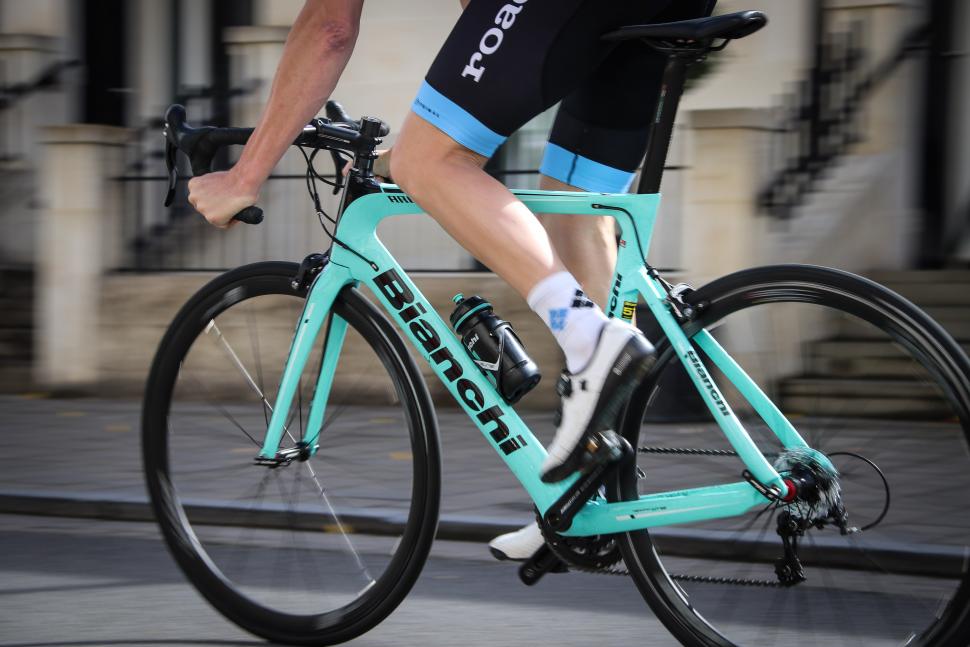
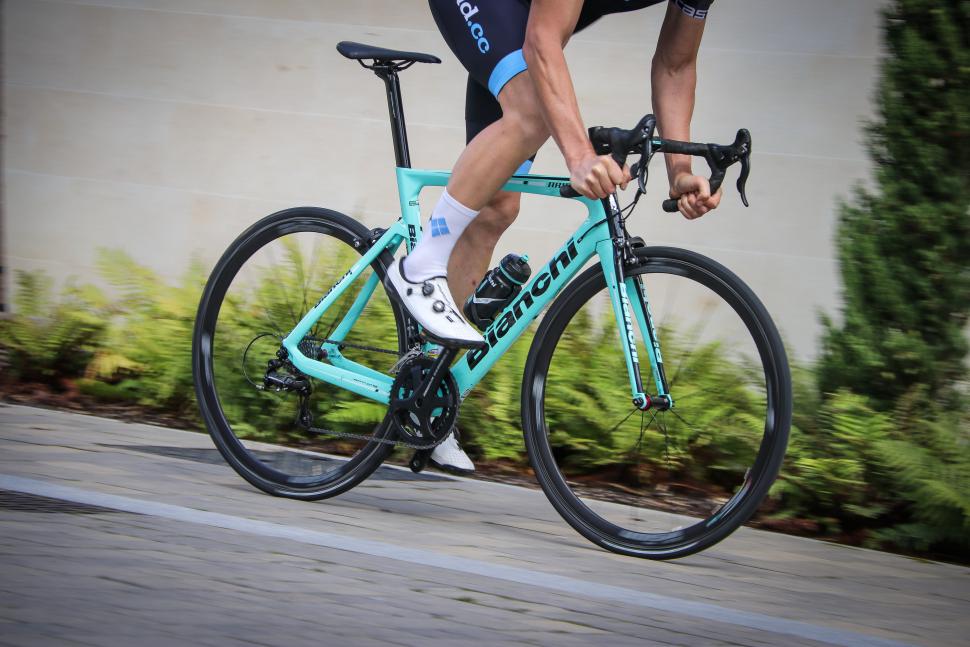
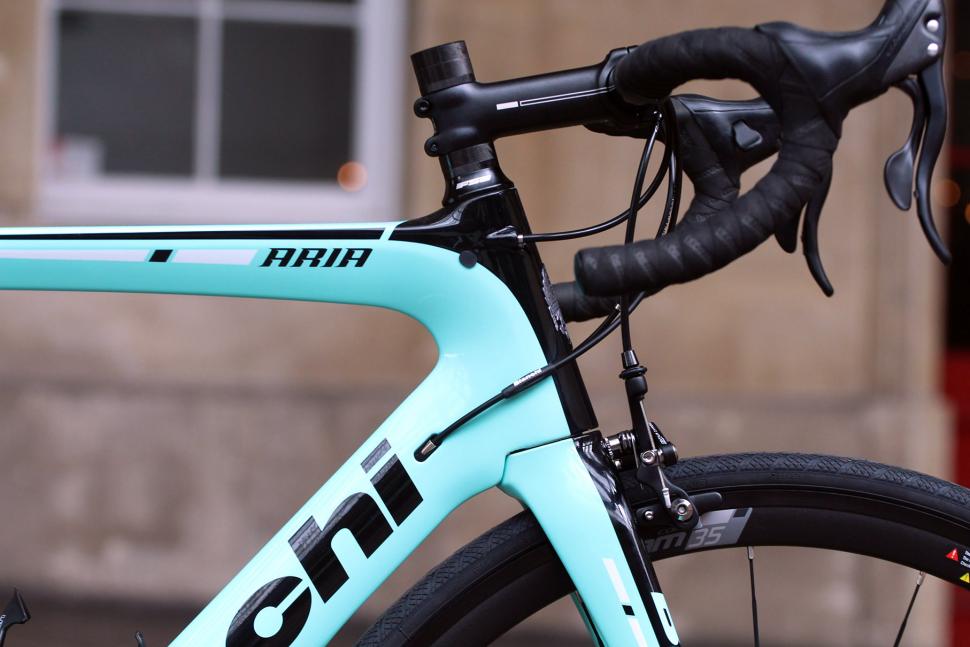
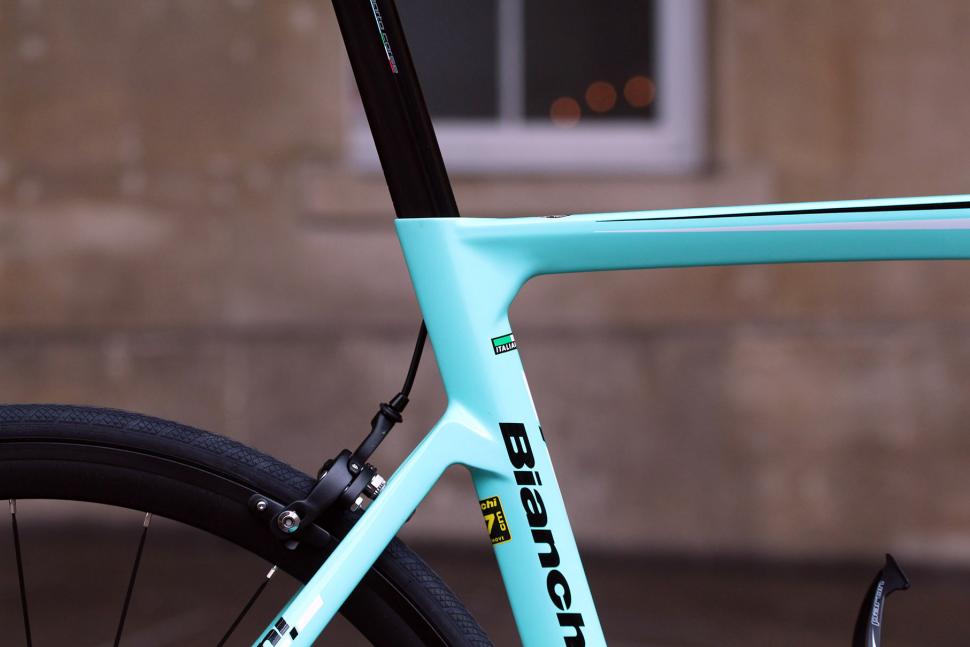
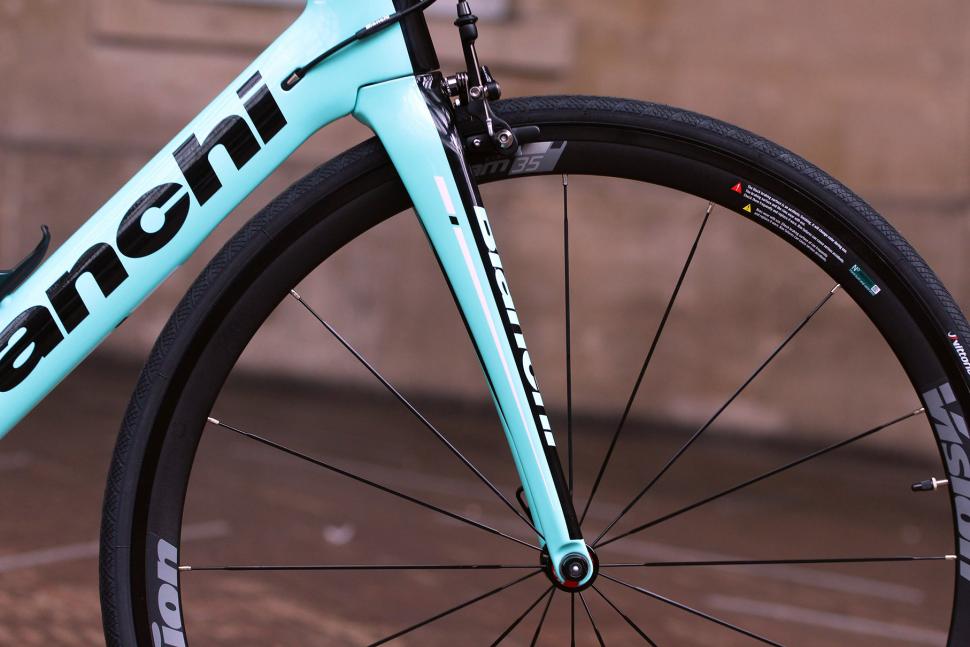

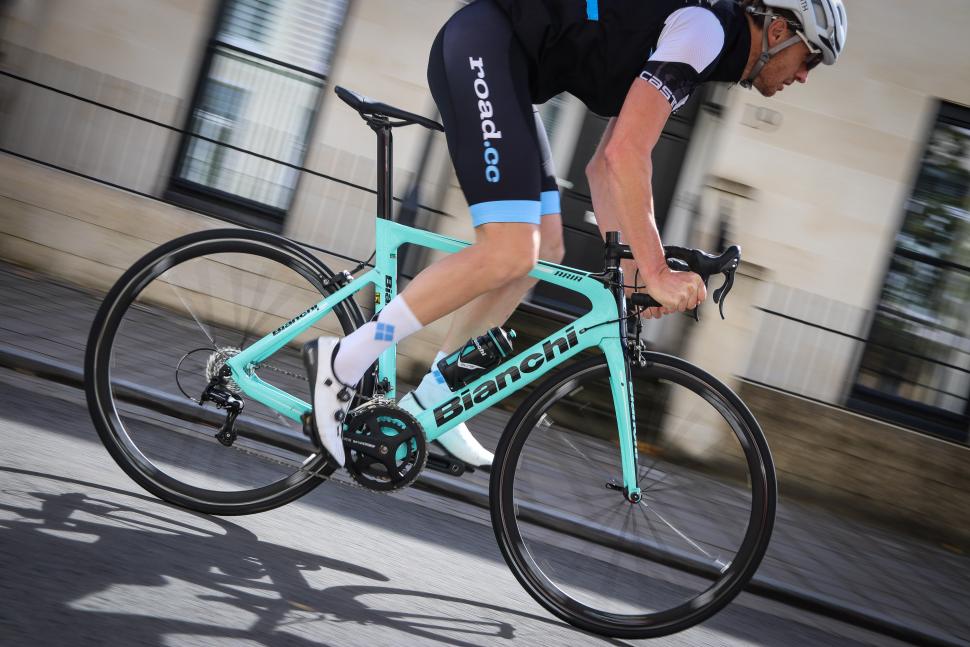
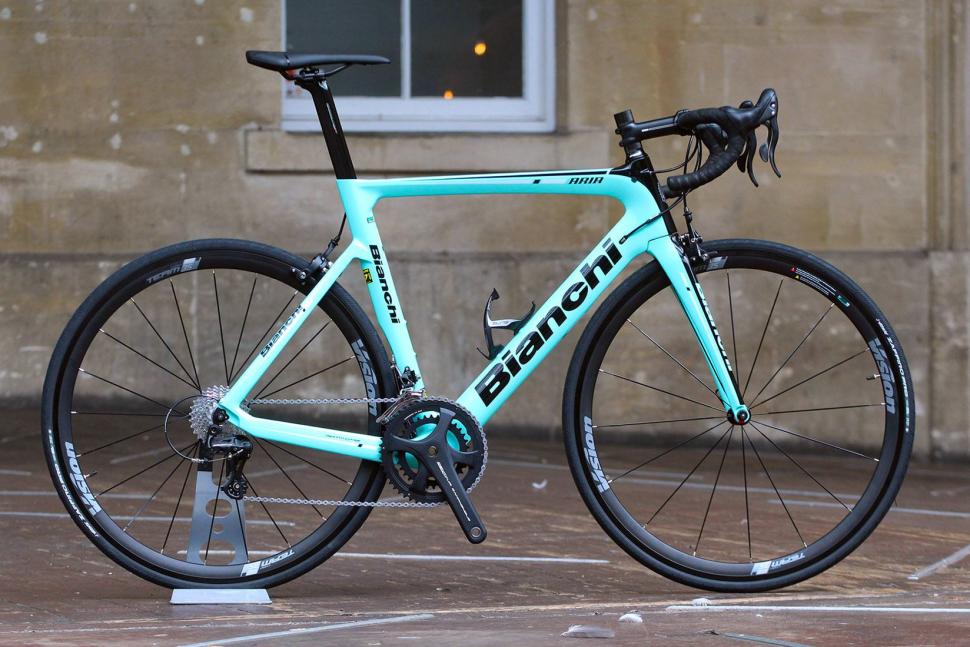



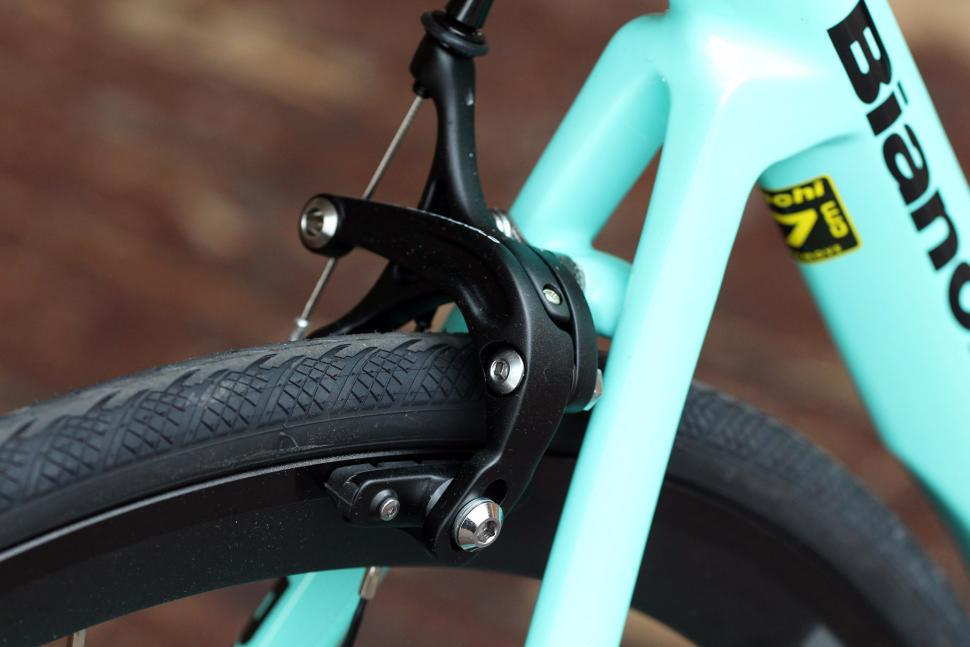
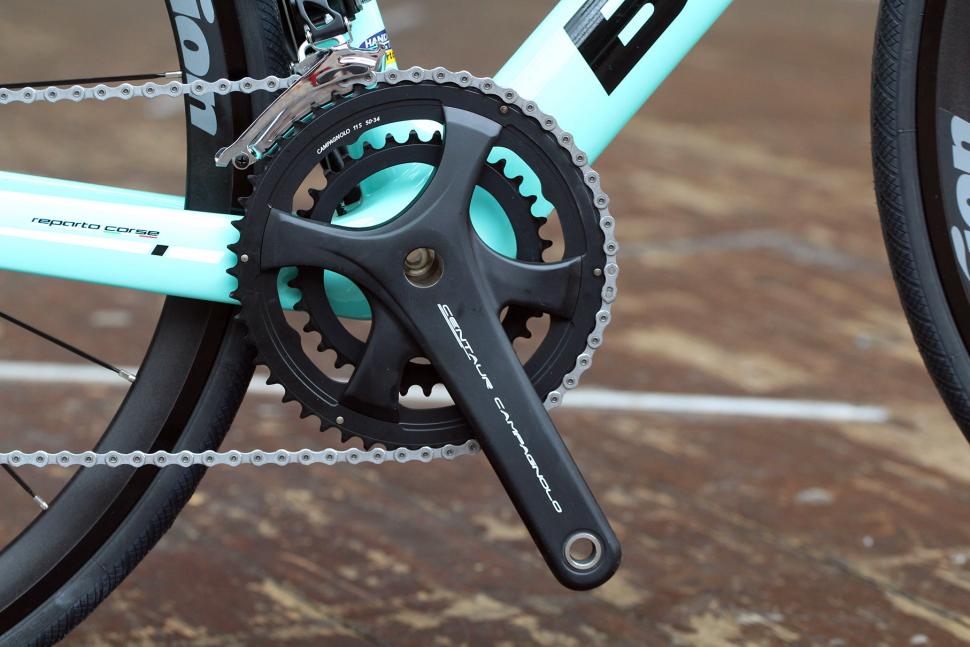
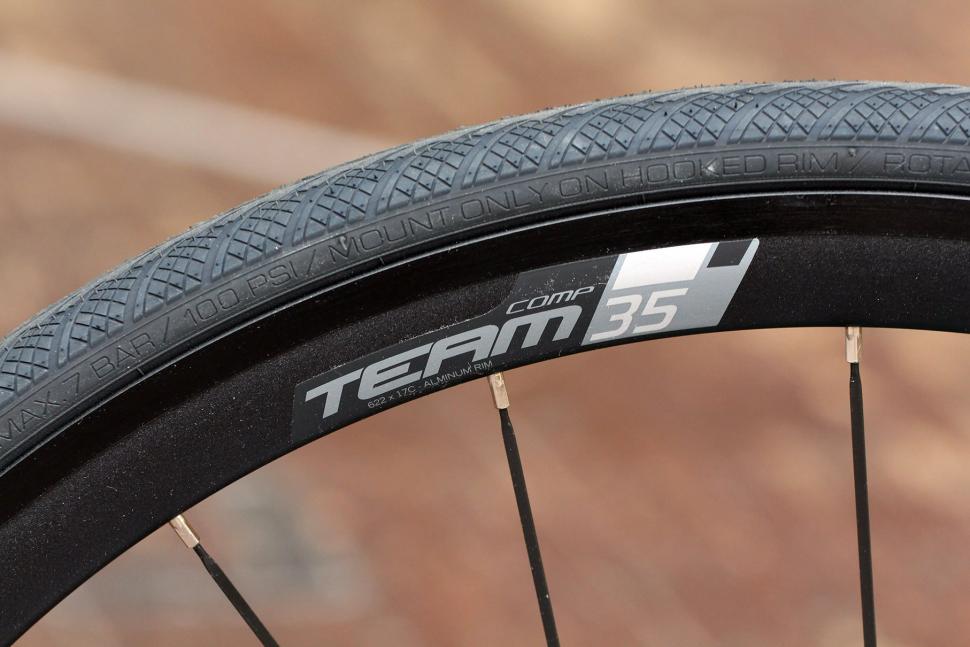
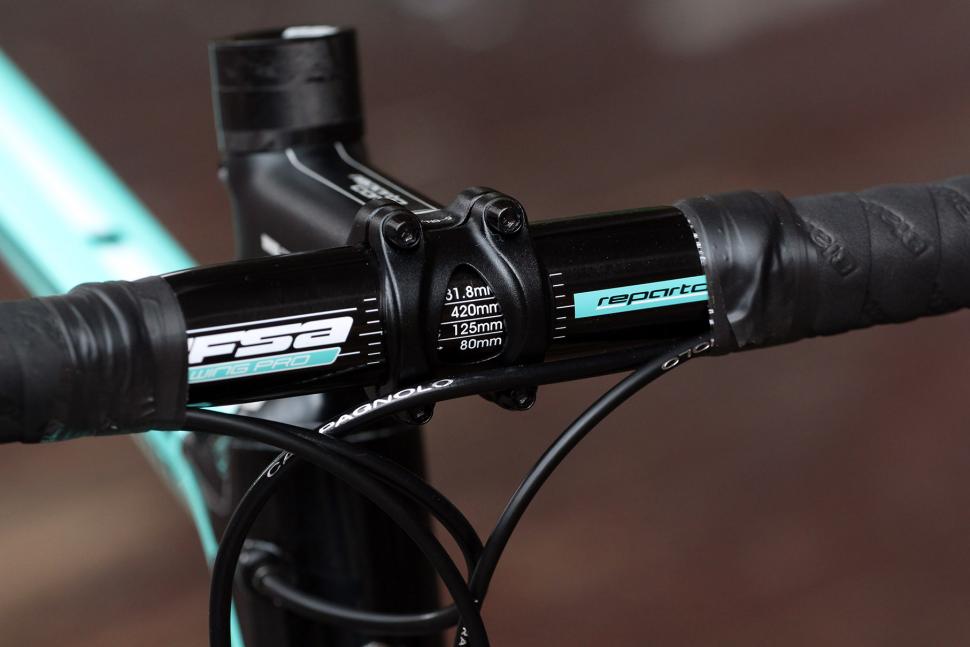
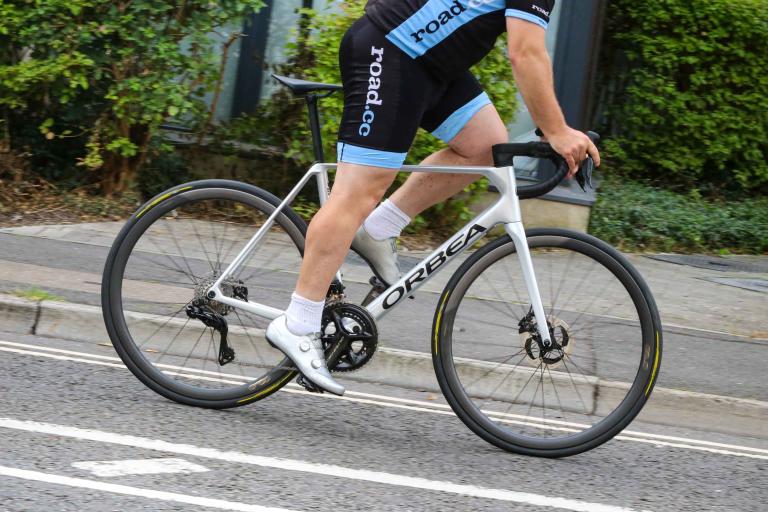
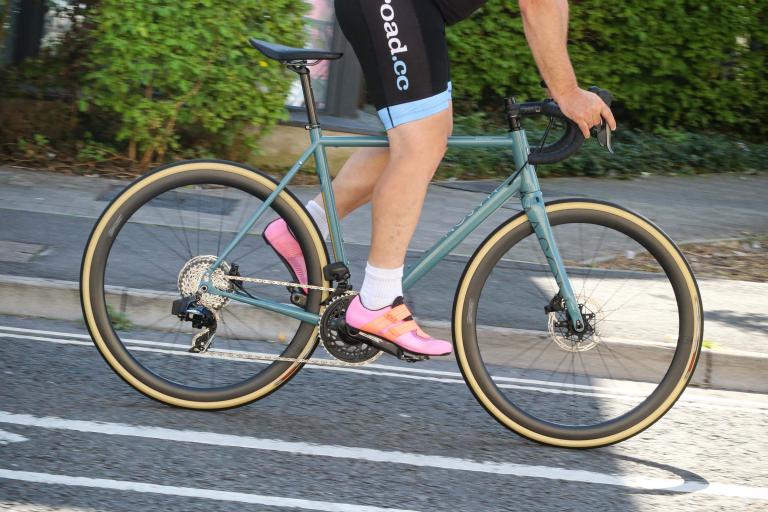
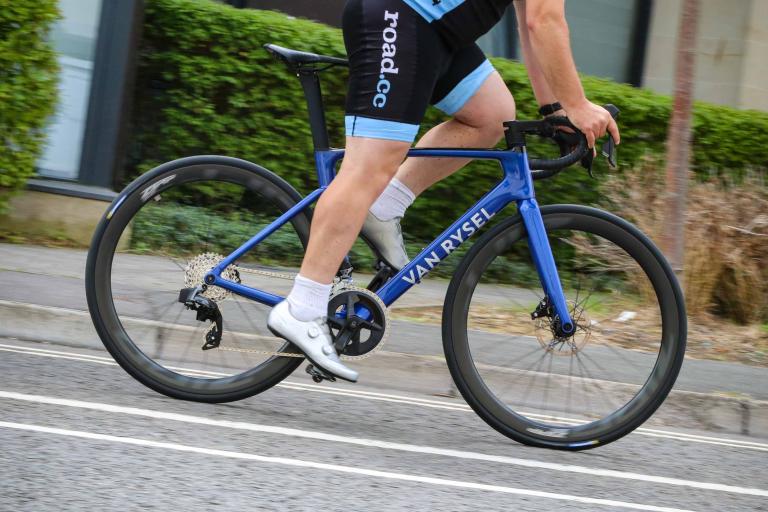
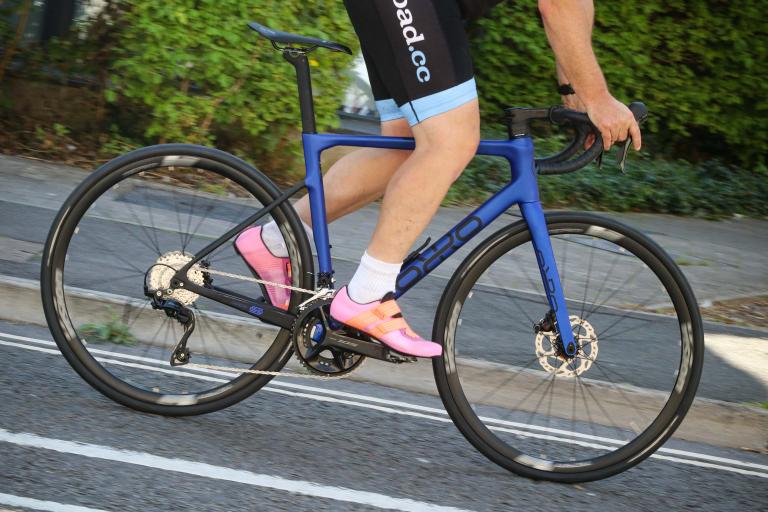
Add new comment
7 comments
The Centaur chainset is a little bit pretty.
Indeed. I have a 10sp Centaur Red group and that is really pretty with red lettering, cables, hoods and shiny carbon levers. Brought some Campag glamour to a reasonable price point, wish they'd bring Centaur Red back.
Ugh Zaffiros?? As if they couldn’t spec at least Rubinos for a bike this price.
the proper german term for luganos-zaffiros
"ohne reifen"
The frame looks fantastic. Whack Chorus and lighter mid section wheels on and it'd be dynamite.
When are we going to talk about that electrical tape wrapping job
very, very shoddy.